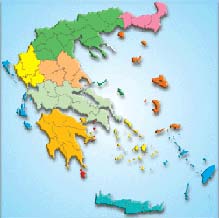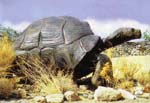
Please click on the map,
the region you want to visit |
|
|
|
|
| |
|
 |
Collection of Natural History of Vrissa |
|
The area of Vrissa-Vatera with the unique Mediterranean beach is characterized as being particularly rich in paleontological fossils, unique not only in Greece, but perhaps in the whole of Europe. During the excavations in the area of Vatera, fossils of different species were discovered within lakes and river sediments.
 In the clay sediments of the lake of that era, fossilized fish of various sizes had been found, the largest of which reaches 80 cm. In the clay sediments of the lake of that era, fossilized fish of various sizes had been found, the largest of which reaches 80 cm.
The environment was of fresh-water and besides fish, several fossil plants have been found such as carnivorous aquatic plants, sedges and various species which currently do not grow anymore.
On the shores of this lake, various animals were arriving to drink water. Footprints of these animals have survived in some places.
The main animal fossils found are:
The jawbone, the tusks and other parts of the skeleton of a "Provoskidotos" of mastodons Anancus arvenensis, which was disappeared before 1.6 million years. In several locations fossilized horse bones of various sizes were identified, including one with welded legs, of larger dimensions than the usual Equus stenonis.
Also, bones and jaw of the carnivorous Nyctereutes megamastoides were discovered, a relative to the current raccoon, as well as bones of giraffes, rhinos, various sizes of deer, antelopes, gazelles and other animals, including turtles.
Impressive findings are also the bones of a giant turtle of about 2.50 meters, a size comparable to a car.
The most exciting from the findings are the occurrence of very rare species, such as a family of giant apes of the genus of Paradolichopithecus, the younger representatives of the kind has been found ever in Europe.
The abundance of fossils from gazelles, horses, deer, tortoises and antelopes indicate an ancient environment of savannah and the sediments suggest the existence of river systems that were crossing the woodlands of the region and were ending up to a lake.
It is also worth noted the existence of a rich fauna of freshwater fish fossils, shells of various sizes, as well as fossilized flora. The findings, by using specific methods, were estimated to be 2 million years old.
|
| Source: Prefecture of Lesvos. |
|
|